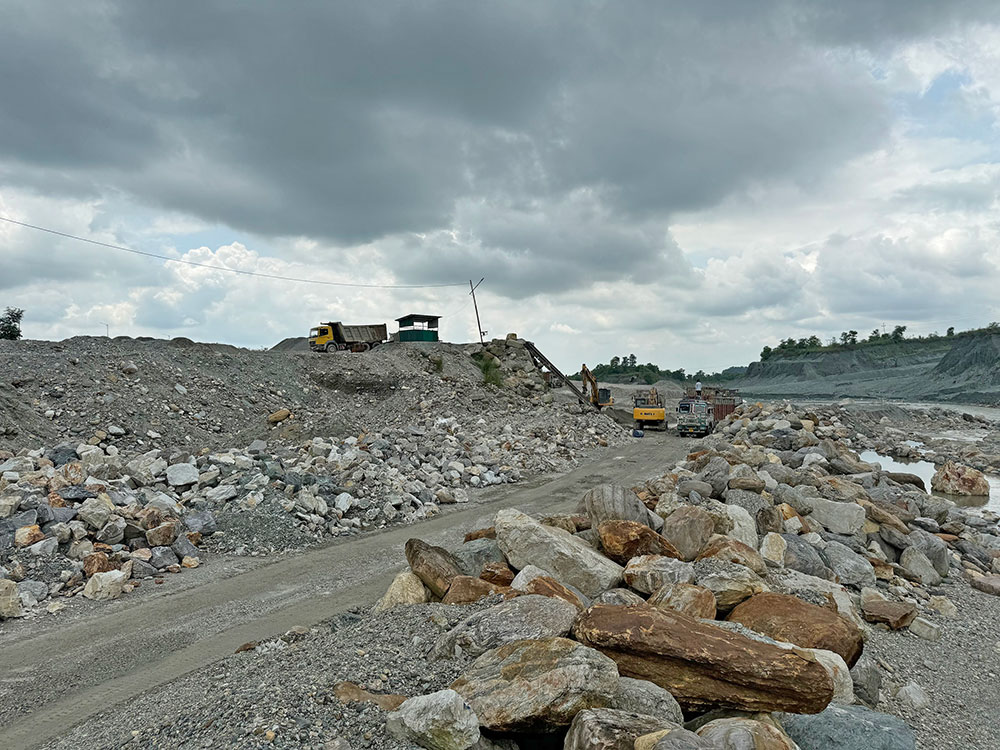Lhakpa Quendren
Samtse—Fronting, synonymous with businesses in border towns of Bhutan, has now penetrated the boulder export industry.
A Kuensel investigation has revealed a surge in fronting activities, with unreliable operators flooding the sector and distorting market dynamics.
Fronting—a practice where businesses from neighbouring countries use local licenses to operate while funneling revenue abroad—is affecting legitimate exporters, making it nearly impossible for them to compete.
Boulder export is a thriving business in Samtse, Phuentsholing, and Gelephu. Once bustling with authentic exporters, it is now inundated with questionable operators.
In Phuentsholing alone, of the 180 registered exporters, only about 15 are considered legitimate. Samtse faces a similar issue with just 15 out of 70 exporters being genuine.

These fronting operations, often run by foreigners through local fronts, manipulate market prices and evade taxes, leaving honest businesses at a disadvantage.
An exporter in Samtse said that the number of boulder exporters has sharply increased from 30 to 70 in the two locations of Samtse—Dhamdum and Satshamchhu—within a few years.
“Many of these operators do not have established offices. They remain operational during profitable periods but pull out when market conditions worsen,” he said, adding that such practices potentially risk the future of the boulder sector.
Despite a base price of USD 16 per metric tonnes (MT) set through export letters of credit (LC), the market price often falls below this threshold due to fronting practices.
In 2018, while Samtse accounted for 65 percent of the boulder exports and Phuentsholing 35 percent, the business income tax collected from Phuentsholing was significantly higher than Samtse’s collection—Nu 14.5 million.
Fronting operators exploit loopholes to avoid paying royalties, taxes, and other costs, selling boulders at reduced rates. “They also use their own transportation, which gives them an advantage. Our revenue from boulders is only 30 percent, with 70 percent going to transportation.”
Recently, the price dropped to USD 14 per MT, and exporters say it is unlikely to rise.
Although the incoming hard currency for the government is protected by the base price of USD 16 per MT, even if the market price drops below this endorsed price, the exporters urge relevant agencies, including revenue and customs, the Anti-Corruption Commission, and Royal Bhutan Police to collaborate and investigate this issue thoroughly.
“Without concrete evidence, we cannot file a formal complaint,” one exporter said. “The issue can be traced through financial transactions. Authorities need to investigate the flow of funds and their uses.”
An exporter in Phuentsholing said that the government is not addressing the problems despite being aware of the situation. “Some have even anonymously lodged complaints with the regional trade office, but no action has been taken,” he said. “Even the documentation is being handled by the funding sources. The investigation should start by cracking down on larger companies.”
There are past incidents where local exporters engaged in fronting, working on commission and salary, were unable to pay business income tax because their revenue went to the funding sources, according to the exporters.
As payments are made in US dollars directly to banks in Bhutan and exchanged into Bhutanese currency for issuance to exporters, fronting practices result in Bhutanese currency remaining stockpiled in the Indian market.
Despite multiple consultations with government agencies and the Bhutan Chamber of Commerce and Industry, no concrete outcomes have been seen. Many exporters believe these consultations are merely a formality to justify budget expenditures without effecting real change.
“The issuance of licenses is not being scrutinised. There is a need to question the intention of the business and investigate whether the person is financially stable to operate the business, to avoid fronting practices,” an exporter said.
In July 2021, the erstwhile Ministry of Economic Affairs warned against fronting and threatened legal action under the Penal Code (Amendment) Act of Bhutan 2021. However, enforcement has been lax, and fronting continues to thrive across various sectors.
During the fourth session of the third Parliament, fronting was classified as a criminal offense under the Penal Code (Amendment) Act of Bhutan 2021.
Fronting practices are not the only factors influencing market prices. The declining demand in Bangladesh, exacerbated by the current political situation, has also raised concerns among boulder exporters. The rate has dropped from USD 19 per MT to USD 16 per MT since the pandemic.
“While we continue to export boulders to complete previous LCs, we are skeptical about payment for further exports. I am now sending only 10 truckloads a day, down from 20 or 30. We are exploring the Indian market, where exports have increased due to new road projects in Bihar,” said an exporter in Samtse.
Meanwhile, exporters in Satshamchhu, Samtse, are waiting for the new border gate at their location. “We have deployed about 10 excavators and other machines to maintain the road between the dry port and Satshamchhu. This season alone, we have maintained the road five times, incurring huge expenses,” said an exporter.
While the system in the country has improved, illegal fee collections along the border remain a major hurdle. Streamlining these protocols, exporters say, would greatly benefit both exporters and transporters.


